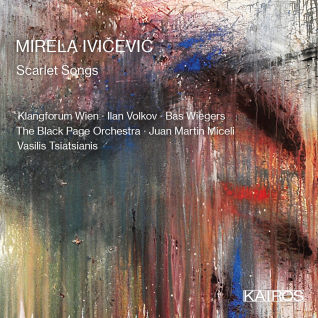When speaking of her fundamental approach to composing, Mirela Ivičević, a Croatian native currently based in Vienna, has described herself as focusing on using as basic materials “bits and pieces of reality abducted from their natural environment into a surreal acoustic world” of rapidly shifting structures driven by an element of the arbitrary. Ivičević’s formulation neatly translates into musical terms the classic Surrealist method of alienating things from their mundane contexts and bringing them together in unexpected or incongruous combinations—of juxtaposing them through what Pierre Reverdy, in his proto-definition of the Surrealist image, termed the “rapprochement of two more or less distant realities.” The rapprochement of more or less distant musical realities may mean, as she told Tim Rutherford-Johnson in a 2017 interview, “bringing together extremes” of pitches, timbres, or other musical parameters.
CASE BLACK (2016), one of five recent compositions on the album Scarlet Songs, shows one way to do this. Recorded live by the Black Page Orchestra, CASE BLACK is a work of disparate parts that Ivčević describes as “rawly assembled randomness/Miraculously coexisting.” In its overall architecture, the piece jump cuts between full-ensemble sound masses to quiet passages for small instrumental subsets. The makeup of the ensemble, which includes a rock drum kit and electric guitar in addition to conventional orchestral instruments, itself represents a bringing together of musical realities once considered quite distant. The orchestration contrasts staccato work for percussion and electric guitar with legato lines laid out on bowed strings; after unfolding as a series of sharp discontinuities it ends with a serene piccolo melody played over arpeggiated guitar chords suggesting the soundtrack to a Western.
“Rawly assembled randomness/Miraculously coexisting” accurately describes not only CASE BLACK, but its counterpart CASE WHITE (2018) and the other works on the album as well. The F SonG (2014/2016) for an ensemble of flute, tenor saxophone, electric guitar, piano, violin and electronics, also recorded live by members of the Black Page Orchestra, ricochets back and forth between dynamic extremes with an elasticity that seems to approach its breaking point without ever quite reaching it. The basic material of Baby Magnify/Lilith’s New Toy (2017), like The F SonG recorded live in Berlin in January 2020, consists of tight, repeated motifs contrasting with ponderously weighted sound masses. Ivčević has described Baby Magnify’s underlying structure as following the four main stages of the alechemical process; in the changing aggregations and disaggregations of timbres the transmutation of prima materia finds its musical analogue. In Sweet Dreams (2019) for large ensemble the shape-shifting of Ivčević’s soundscapes takes place between compressed episodes of almost obsessively repeated figures and passages shot through with open space.







